 |
|---|
The Independent Transport Workers Association of Nepal (ITWAN) was a Nepalese trade union formed in 1979. The union existed as a separate entity until 1989, when it helped form the General Federation of Nepalese Trade Unions.
 |
|---|
The Independent Transport Workers Association of Nepal (ITWAN) was a Nepalese trade union formed in 1979. The union existed as a separate entity until 1989, when it helped form the General Federation of Nepalese Trade Unions.

The South Asian Association for Regional Cooperation (SAARC) is the regional intergovernmental organization and geopolitical union of states in South Asia. Its member states are Afghanistan, Bangladesh, Bhutan, India, Maldives, Nepal, Pakistan, and Sri Lanka. SAARC comprises 3% of the world's land area, 21% of the world's population and 5.21% of the global economy, as of 2021.

The Communist Party of Nepal is a communist political party in Nepal. The party emerged as a major party in Nepal after the end of the Panchayat era.

The Communist Party of Nepal (Marxist) was a Nepalese political party. It was formed on 1 November 1991 by a group of former leaders of the original Communist Party of Nepal (Marxist) that had been expelled from the Communist Party of Nepal. Initially, it was known as the Communist Party of Nepal but took the name Communist Party of Nepal (Marxist) after approximately one year of existence. Prabhunaryan Chaudhary was the chairman of the party.
The Nepal National Teachers Association (NNTA) is an organization of teachers' trade unions in Nepal. It is the first and the most influential organization of teachers' association in Nepal. The NNTA was established in 1979 and registered under the educational act of that time, and then become a trade union. Currently, it has more than 70 thousand members. NNTA has established international relation and is the first member to the WCOTP from Nepal, and a charter member to Education International (EI) global union federation. NNTA is also affiliated or has working relationships with the trade unions and professional organizations in Nepal and around the world. NNTA has a close relationship with the Communist Party of Nepal.

The South Asian Free Trade Area (SAFTA) is a 2004 agreement that created a free-trade area of 1.6 billion people in Afghanistan, Bangladesh, Bhutan, India, the Maldives, Nepal, Pakistan and Sri Lanka with the vision of increasing economic cooperation and integration.

The Communist Party of Nepal (Marxist) was a political party in Nepal. It was formed through the merger of the Communist Party of Nepal (Manmohan) led by Man Mohan Adhikari and the Communist Party of Nepal led by Sahana Pradhan in 1987. The Nepal Trade Union Centre was the trade union of CPN (Marxist) and Nepal Progressive Students Union was their students' union.

Communist Party of Nepal (United) was a political party in Nepal. In 1991, after the first general election, through the merger of Communist Party of Nepal (Democratic), Communist Party of Nepal (Burma) and Communist Party of Nepal (Amatya). Both the Burma and Amatya-led factions did however break away from the party soon after the merger. The youth wing of the party was called Nepal National Youth Federation. Its trade union wing was called Nepal Trade Union Federation.
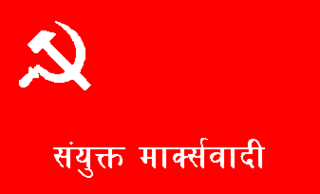
The Communist Party of Nepal was a political party in Nepal existing from 2005 until 2013.

The Bay of Bengal Initiative for Multi-Sectoral Technical and Economic Cooperation (BIMSTEC) is an international organisation of seven South Asian and Southeast Asian nations, housing 1.73 billion people and having a combined gross domestic product of US$4.4 trillion (2022). The BIMSTEC member states – Bangladesh, Bhutan, India, Myanmar, Nepal, Sri Lanka, and Thailand – are among the countries dependent on the Bay of Bengal.

The 2006 Democracy Movement is a name given to the political agitations against the direct and undemocratic rule of King Gyanendra of Nepal. The movement is also sometimes referred to as Jana Andolan II, implying it being a second phase of the 1990 Jana Andolan.

Democratic Confederation of Nepalese Trade Unions (DECONT) was a central trade union organization in Nepal. DECONT is politically tied to the Nepali Congress (Democratic). The president of DECONT was Rajendra Bahadur Raut.
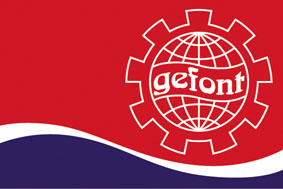
The General Federation of Nepalese Trade Unions (GEFONT) is a confederation of 20 national trade union federations. It is politically tied to the Communist Party of Nepal. GEFONT declares its goal to be "Socialism for the dignified working-class and prosperous life".

The All Nepal Trade Union Congress (ANTUC) was formed in 1946 and was the first trade union to ever exist in Nepal. The union was formed by a mixture of communists and socialists, the latter group leaving in 1950 to form the Nepal Workers Union, however they received little support.
The Nepal Trade Union Congress (NTUC) a national trade union center in Nepal. Founded in 1947, it was the first and largest trade union confederation in country. The NTUC is politically linked with the Nepali Congress (NC).
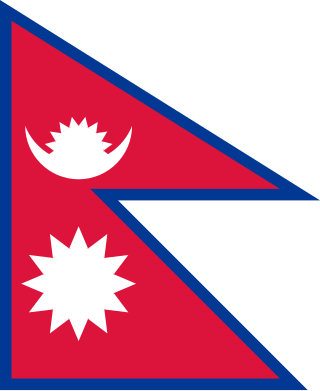
The following outline is provided as an overview of and topical guide to Nepal:
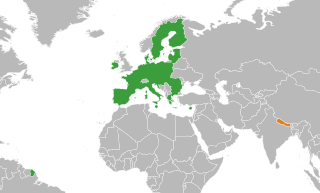
Nepal–European Union relations are the relations between Nepal and the European Union (EU). The role of the European Union is to present, explain and implement EU policies, analyze and report on the political, social, and economic situation in Nepal, and to conducts negotiations in accordance with a given mandate.

The ICFTU Asia and Pacific Regional Organisation (APRO) was a regional organisation of the International Confederation of Free Trade Unions (ICFTU), representing trade unions from countries in Asia and Oceania.
Korean Nepalese are the Nepalis who form a small expatriate community consisting mainly of Catholic nuns, volunteers and businesspeople. According to South Korea's Ministry of Foreign Affairs and Trade, there were 645 South Koreans living in Nepal as of 2013, up by more than 70% from 374 in 2009. There are also known to be some North Koreans doing business in the country.

The Unified Communist Party of Nepal , abbreviated UCPN (Maoist),, was a political party in Nepal. It was founded in 2009 after merging with minor Communist parties including the Janamorcha Nepal. On May 19, 2016, it merged with ten other breakaway factions and minor parties to form Communist Party of Nepal.
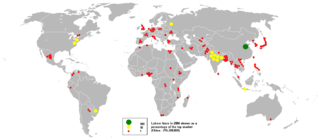
Nepal has a labour force of 16.8-million-workers, the 37th largest in the world as of 2017. Although agriculture makes up only about 28 per cent of Nepal's GDP, it employs more than two-thirds of the workforce. Millions of men work as unskilled labourers in foreign countries, leaving the household, agriculture, and raising of children to women alone. Most of the working-age women are employed in agricultural sector, contributions to which are usually ignored or undervalued in official statistics. Few women who are employed in the formal sectors face discrimination and significant wage gap. Almost half of all children are economically active, half of which are child labourers. Millions of people, men, women and children of both sexes, are employed as bonded labourers, in slavery-like conditions. Trade unions have played a significant role in earning better working conditions and workers' rights, both at the company level and the national government level. Worker-friendly labour laws, endorsed by the labour unions as well as business owners, provide a framework for better working conditions and secure future for the employees, but their implementation is severely lacking in practice. Among the highly educated, there is a significant brain-drain, posing a significant hurdle in fulfilling the demand for skilled workforce in the country.